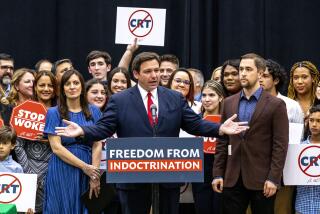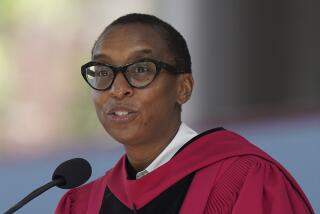When Higher Education and Catholicism Don’t Mix : CAMPUS CORRESPONDENCE
- Share via
DAVENPORT, IOWA — The president of St. Ambrose University recently ordered an advertisement for a women’s health clinic pulled from the student newspaper based on one student’s mistaken belief that the clinic performed abortions, in violation of church teachings.
Weeks later, after discovering that no abortions are performed within a 50-mile radius of Davenport, President Edward Rogalski allowed the ad for Maternal Health Center to run. But he maintained that he “reserved the right to forbid material which is in direct contradiction to the mission or beliefs of the university.”
Although St. Ambrose had the legal right to pull the ad, the incident points up the disturbing role the Catholic Church can play in the education and lives of its students.
For starters, both Rogalski and the offended student were male and apparently assumed that the “reproductive health services” mentioned in the ad meant abortion rather than the many health services crucial to women.
These services range from treatment of a fibrous uterus to removal of an ovarian cyst to prevention of sexually transmitted diseases. Suppressing this kind of information could endanger the health of the university’s female students.
A more general problem is whether a Catholic university, with its special mission as a religious institution, should interfere with the student newspaper.
Universities and colleges in the United States traditionally have been charged with training young people to be better citizens. Teaching students that it is acceptable to repress information you disagree with is contrary to democratic principles. While respecting the right of a church-affiliated school to emphasize a certain belief or creed, repression of information runs contrary to the mission of universities.
The student newspaper should be a forum open to the questioning of beliefs and attitudes, even those beliefs sacred to the church that sponsors it. It is right that Catholic institutions emphasize Catholic values, but the church should have faith in its young members’ ability to make moral decisions, even when exposed to differing ideas.
Is it better for the church to hide all opposing views from Catholics out of the fear that they may not remain true to their faith? If that’s the case, maybe the church needs to review its own philosophies.
More to Read
Sign up for Essential California
The most important California stories and recommendations in your inbox every morning.
You may occasionally receive promotional content from the Los Angeles Times.










